#reference list is completed!
Text
Why Do People Like Yanderes?
Hi everyone, my name is Diya, and this was going to be a YT video-essay-type-thing but I'm too poor to afford a mic and too busy with college to learn how to edit videos, so here's my vague exploration of the psychology behind why people like yanderes so much through the lens of my favourite Visual Novels.
TW for uh. yandere content. Mentions of sex, gore, and non-con, particularly in the last topic. This is more like the first draft of an academic paper so while it's not explicit, I do go into some detail.
Introduction
If you’re a fan of anime or visual novels, then you’re probably already aware of what a yandere is, or at the very least you’ve seen that one picture of Yuno Gasai. Still, for the sake of thoroughness, let’s take it from the tippy top. The term ‘yandere’ is a Japanese portmanteau of ‘yanderu’ – the progressive form of ‘yami’ – meaning ‘sick’, and ‘deredere’ which roughly translates to ‘loving’. Together, the word refers to someone who is – in short – extremely lovesick. Obsessive to the extreme, and with little morality to spare, the standard yandere is characterized by a dangerous fixation on a chosen target, often appearing shy and caring at first only to flip the script and become violently aggressive towards perceived threats (Kroon, 2010).
It should be noted that yanderes are not a strictly romantic or sexual trope. The Ancient Greeks classified at least six forms of love, from familial (storge) to guests (xenia). Modern psychologists may distinguish love as either Companionate or Passionate (Kim & Hatfield, 2004) or consisting of three dimensions of Intimacy, Passion, and Commitment (Sternberg & Sternberg, 2018). Realistically, possessiveness shows up in a variety of relationships. However, people are generally primed to view certain dynamics as inherently amorous. Societal norms tend to encourage the idea that romantic bonds ought to rank above all others, and therefore if Person A is bizarrely fixated on Person B, then clearly there must be an element of sexual interest involved regardless of the actual relationship between the individuals in question.
Regardless, yanderes remain quite popular in fiction. Many dismiss it as a fetish, which it can be, but that isn’t the case for everyone. While there is nothing wrong with indulging in kinky fiction, not all of us get horny at the thought of being chained up in someone’s basement, no matter how hot our captor may be. So why is it so pervasive? Why is this trope so appealing that most writers cannot help but include at least a single line of dialogue implying that – if circumstances had been ever so slightly different – my wholesome shoujo romcom might have turned into a psychological horror?
Hybristophilia
‘Hybristophilia’, also known as Bonnie and Clyde Syndrome after the titular criminal couple, is a word is derived from the Greek word ‘hybridzein’ meaning ‘to commit an outrage against someone’ and ‘philo’ which means ‘a strong preference for’. Sexologist John Money reportedly defined it as a paraphilia in which an individual is sexually aroused by a partner who has a predatory history of hurting other people (Money, 1986, as cited in Matuszak, 2017). In his book, Serial Killer Groupies, true crime and crime fiction author RJ Parker distinguished two forms of hybristophilia: passive and aggressive. The former is when an individual contacts a criminal with the intention of striking up a relationship with them, allowing themselves to be seduced and manipulated but having no interest in committing a crime themselves. The latter are far more dangerous, as the individual not only derives sexual pleasure from their partner’s atrocities but are active participants in carrying out or covering up the crime. To quote Griffiths (2013, as cited in Pettigrew, 2019):
“[They] help out their lovers with their criminal agenda by luring victims, hiding bodies, covering crimes, or even committing crimes. They are attracted to their lovers because of their violent actions and want to receive love yet are unable to understand that their lovers are psychopaths who are manipulating them.”
In some ways, hybristophilia is the nearest thing we have to a realistic understanding of why people love yanderes. I mean, much of the fantasy surrounding such characters and their media tend to be filled with posts begging to be spat on or calling the rightfully terrified main character ungrateful for being a teeny bit upset about finding surveillance cameras in their ceiling. However, enjoying fictitious immoral activity does not predict real perpetration, so what does? There exists little consensus amongst psychologists as to what sparks this particular predilection, and that was strange to me. You would think there would be more studies into this topic, in spite of or perhaps because of its controversial nature. Heck, that one dude wouldn’t shut up about white women’s obsession with Bundy and Dahmer, and I assumed he had gotten that information from somewhere, but it turns out that was just him using modifiers to justify sexism.
However, I believe that we can hedge a few guesses, and over the course of my research, I’ve organized the main rationalizations under four umbrellas which I will explore through the lens of my favourite yandere-themed Visual Novels. Please keep in mind that most of these games are rated as mature due to sexual scenes and/or gore. Additionally, in the spirit of transparency, this ramble will be focused exclusively on male or masculine yanderes. So, without further ado:
Call Me Bob the Builder Because I Can Fix Them
If you’re familiar with DC Comic’s Batman, or just happen to have attended any costume event held over the span of the last 20+ years, you may be familiar with the character of Dr. Harleen Quinzel, better known as Harley Quinn. Initially created as the Joker’s one-off sidekick in Batman The Animated Series, she was so well-received by audiences that she became a recurring character in the cartoon and was eventually given a proper origin story in the form of a one-shot titled Mad Love.
Harley’s origin story has seen some alterations over the past decades, but the core aspects remain largely untouched. In the beginning, Harleen Quinzel was a promising young woman who wanted was a degree from the university’s prestigious psychology department, which she gained through…less than scrupulous means.
(Listen, I’m not sure if the authors were leaning on the Dumb Blonde stereotype, or if they simply thought that casting her as a genuinely bad student would make her later actions more believable. Either way, the idea of Harley as someone with a legitimate PhD came later)
After landing an internship at Arkham Asylum – a half-hospital and half-prison straight out of the 1870s that might as well be built out of one-ply tissue-paper soaked with gasoline and left next to a crate of fireworks – Harleen set her sights on the then incarcerated Joker. At the start, her fixation on the criminal wasn’t remotely sympathetic. She didn’t want to help him, she wanted to use him. Harleen Quinzel wanted piggyback off his infamy and write a tell-all tale detailing what sort of messed up childhood resulted in Gotham’s Clown Prince of Crime. Yet the more she interacted with him, the more the Joker took advantage of her empathy. By the end of their sessions, Harley no longer saw him as a violent serial killer with a clown schtick, but as a “lost, injured child looking to make the world laugh at his antics.”
But Diya, you may be asking, what does this have to do with the video? The Joker never loved Harley, and it could even be argued – as Shehadeh did in a 2017 essay – that her obsession with the pasty-faced clown is more akin to Histrionic Personality Disorder. While that may be the case, I believe that Harley’s story provides one of the reasons yanderes are so popular: their backstory.
Whether they were abandoned by their family, bullied by their peers, experimented on by evil scientists, starved on the streets, died under mysterious circumstances and then trapped in a haunted VCR tape for decades, or are simply so impossibly inhuman that they frankly do not understand why it isn’t socially acceptable to imprison their crush in a pocket dimension made of meat and non-Euclidean geometry, yanderes often have fairly sympathetic or at least understandable explanations for why they are Like That. Your mileage may vary significantly depending on how much you sympathize with these motives, but the point is that yanderes always make sense to some degree. Their morality and priorities may be twisted or even completely incomprehensible, but the audience almost always knows the reason, and that can be comforting. In the real world, other people aren’t always straightforward, and we never really know what they’re thinking, but narrative coherence demands a semblance of internal consistency lest the audience end up frustrated and confused. So yanderes are not only easy to sympathize with, but also fairly predictable. In-universe they may be unhinged freaks with a blood fetish, but to you watching from behind the safety of the screen they’re just acting out the script written for them based on a prototype. And if you understand the why behind their loose gears, then you might just be able to put them back together again.
The concept of rescue romances or “I Can Fix Them” has been around in our stories for thousands of years. The Epic of Gilgamesh detailed how Shamhat essentially ‘civilized’ wild man Enkidu through ritual lovemaking, and a concerning number of religions push the idea that women are dutybound to save men from the follies of sin. Yet men are not exempt either, with one notable example being the German fairytale, King Thrushbeard. Call it what you will regardless: Knights in Shining Armour, the Florence Nightingale Effect, or a plain old case of Because You Were Nice to Me, studies have shown that human beings generally like helping [DA2] others, even when the reason doesn’t necessarily stem from pure altruism. I will delve deeper into this later, but care and compassion are deeply ingrained in human nature, and arising from those roots is the appeal of this mentality: You can save them. You can change them. You can make them better. You are special, and the way you treat this person carries a weight that has not and will never be matched by anyone else for the rest of their mortal or immortal existence.
The illusion is a delicious one, especially if the person you’ve helped turns out to be a billionaire CEO with cash to burn, a super powerful ghost king willing to raze continents to dust for you, a demon having fun on a Friday night, or just your average hot creep with a knife. Moreover, different people have different ideas of what ‘fixing’ even means. Maybe you want to single-handedly rehabilitate your yandere into a functional member of society. Maybe you’re cool with the incessant stalking but would like them to stop slaughtering your friends, family, and local service workers. Maybe you want to make them much, much worse.
Not only do yanderes provide immediate proof that your actions have a tangible impact on the lives of others, but the fantasy also includes the desire of being seen as special. Of being admired and adored by someone whose life you inexplicably made better by virtue of simply being yourself, or an idealized version of yourself. In this fictional world, in this imaginary setting, the person you are is so uniquely, impossibly irreplaceable to someone. And if that’s the case then they can’t risk losing you, can they?
The Allure of Obsession, or ‘Til Death Do Us Part (Literally)
It shouldn’t be necessary, but here is my obligatory disclaimer anyway. Ahem: obsession is not a good thing in real life. Fixating on another human to the detriment of your own wellbeing and that of those around you is dangerous, as is encouraging someone else to obsess over you. You might think you are being worshiped, but real life is not a visual novel. The outside world doesn’t come with an age rating, the author’s guiding pen, and a convenient fade to credits sequence once you’ve reached an ending. The consequences will still be there in the morning, so don’t do it. Just don’t.
PSA out of the way, it’s natural to want to be wanted. Maslow’s Hierarchy places it just above physical safety, but I’d argue that it could easily be compared to baser drives. According to many psychological and anthropological studies, much of humanity’s continued survival and environmental dominance is largely attributed to our ability to form groups, cooperate with one another, and maintain complex interpersonal networks. Social support, intimacy, and a sense of belonging are linked to emotional and physical benefits, such as more optimistic health perceptions, higher subjective well-being, increased creativity and innovation, and greater self-efficacy (DeWall & Bushman, 2011; Harandi et al., 2017; Wang & Sha, 2018). Therefore, it’s perfectly understandable that rejection of any sort would be construed as a threat.
But if someone is obsessed with you, then you have no reason to worry about that, right? No more nights spent agonizing over how they feel about you, asking yourself whether your last text made you sound too desperate, or if you’re boring them because you spent the past hour info-dumping about Stardew Valley farm layouts. With a yandere, there will never be any doubt that they care about you. Sure, they might go about it in weird, manipulative, and insidious ways that violate your physical and mental autonomy, but you can’t deny their loyalty. They do love you in their own bizarre way. You are the sun around which they orbit. When you’re in the room, no one else exists. Every single messy flaw is just another bullet point on the mile-long list of why they adore you.
In essence, yanderes are not only attentive, but their love can be virtually unconditional. A yandere might know everything about you, and still revere you. It’s unhealthy as hell and you might genuinely question their taste, but it can be tempting to pretend that all of you, right down to the ugliest parts of yourself – the traits and choices that you would never share with another living soul even at gunpoint – are worthy of understanding, if not open praise and affection.
Attractiveness, or Okay but Have You Considered That They’re Hot Though?
.
.
.
I mean what am I supposed to say here? They’re hot, what do you want from me?
No, but in all seriousness, fictional media paints an idealized version of the world, and most yanderes are hot because they have the freedom of existing purely behind that screen; artfully arranged and edited to forever appear compelling to anyone who happens to enjoy their particular style. And there are a lot of styles to choose from. Whether you want them pretty faced and disarmingly cute, or scarred up and big enough to pin you like a butterfly, yanderes come in a wide variety of shapes and sizes that are meant to pique your interest and draw you in like a naïve little fish being lured towards the mouth of an angler fish, unwilling to believe that anything bad might happen to us when the bait is this pretty.
This is often referred to as the Halo Effect, a form of cognitive bias referring to the tendency for people to assume that a single obvious positive trait must be associated with other positive traits. The go-to characteristic is typically physical attractiveness, but a nice voice, good humour, and cooking skills are also factors which serve to influence our perceptions.
So, conventional physical attractiveness is one thing, but that’s only skin deep. What about beyond that? After all, the yandere still has to talk to you before they enact their master plan of tying you up in their basement until Stockholm Syndrome kicks in.
When I showed my friend a picture of John Doe from the game John Doe, she told me that he looked like a creepy slob, and she’s far from the only person who’s ever thought so. Look at them. I feel like if I tried to comb that hair it would simply eat me, and some of the CGs really put the scopophobia in Scopophobia Studios. I love Doe, but he is not hot, and he doesn’t behave in a normally appealing way either. If the player chooses not to take a bath, Doe will immediately comment that you “smell good” before following you home, breaking into your house, and leaving a bloody organ on the floor for the player to trip over. Many yanderes can at least fake a veneer of normalcy, but from the get-go Doe doesn’t even bother to pretend he’s anything less than an otherworldly creature stuffed into a vaguely person-shaped meatsuit. In an effort to find out why so many people had latched on to Doe – including me – I shopped around social media and YouTube for answers, and what I found was a widely unanimous sentiment.
While some were drawn to his fun design and goofy personality, most simply thought that he wasn’t inherently malevolent, just very confused. In addition to being a supernatural being with a completely alien axis of morality, Doe’s meta-awareness and unbridled attempts at winning the player’s affection lends him quite a bit of support from the audience, especially if you yourself also happen to struggle with social cues and relate to his pure earnestness. In Ending 7 of the extended version, the player character has the option to tell Doe – who has altered himself to pass as more ‘normal’ – that they prefer who he truly is, at which point he grows visibly flustered and sports an adorable pair of literal heart-shaped pupils.
Whether they’re charismatic, seductive, cute, sweet, funny, nurturing, or generous, the best yanderes have engaging personalities. Even while they’re committing truly heinous crimes against God, man, and your guts, you still kinda want to hang out with them, and you want them to acknowledge you as being just as interesting. And this is all fine in fiction because you’re the one in charge, and if you ever get bored or uncomfortable or busy with something else, then you can simply close the tab or window with zero consequences, which brings us to the final and most important reason.
Power Dynamics and Consent in Fantasy (I Couldn’t Think of a Joke Here Guys, This Is Kinda Serious)
Once again, I feel that I must preface this section just for the sake of my own peace of mind: sexual coercion and assault are vile and disgusting crimes that should never be emulated or tolerated in the real world. We are speaking purely of fictional media, specifically adult-oriented media in this case, so please be mindful.
In 2009, Bivoni and Critelli conducted a study on 355 undergraduate women with the goal of assessing the reasons behind fantasies of non-consent. At the time, there were two leading explanations of this phenomenon. One stated that women with high libidos but repressed views of sex used these imaginary scenarios to alleviate the guilt they had grown to associate with sex. Because the simulation was a purely mental exercise and they themselves were cast as helpless victims in the scenario, they were able to remain blameless while still finding sexual gratification. The second stated that these fantasies were an expression of liberation by women who were adventurous and comfortable enough with their own sexuality to engage with taboo ideas that they weren’t at all interested in performing in real life. Which do you think was more common?
.
.
.
If you guessed the second option, you’d be right. The study found that of the 220 women who had experienced such fantasies, 45% found theirs erotic, 46% were mixed, and only 9% reported pure aversion. One justification for this outcome relies on psycho-biological theories, for example masochistic preferences or the unintended activation of the sympathetic nervous system and subsequent mis-attribution of arousal. Other reasons have to do with higher order thinking and are tied to the power dynamics within such fantasies. On the surface is the appeal of being so desirable to someone that they simply cannot control themselves, but then there is a deeper impulse, which the researchers referred to as Adversary Transformation. To quote the article: “[fantasies] involve a struggle between an assailant and a potential victim in which it is relevant to consider who is the winner and who is the loser. At one level, it is a struggle over sex, but the woman's non-consent may be feigned or token. At another level, the woman may be seeking a victory that is not about whether sex occurs, but about what happens emotionally between the protagonists.”
Basically, the imaginary perpetrator may have ‘won’, but the self-character need not have ‘lost’.
Media provides an extra layer to the illusion, one that you as the viewer have absolute control over. If you are choosing to engage with a piece of media that explicitly labels itself as including R18+ yandere content, then you clearly have some expectations, and that background awareness goes a long way in reducing long-term discomfort and allowing audiences to make informed decisions. If you don’t like the plot, you can simply turn it off it with the click of a button, and when the screen goes dark it’s not like the yandere is going to punish you for saying no. Strade isn’t going to break into your house with a drill, there are no homicidal clown ghosts hiding in your TV, and no suspicious pink-haired hackers watching your webcam. They aren’t real, and the consequences aren’t real either. You have all the power here.
Conclusion
In summary, Yanderes are appealing for a variety of reasons. Whether you want to save them, think they’re attractive, wish to indulge in a dream of being utterly coveted, or simply enjoy a bit of spice in your me-time, it’s obvious why the trope has persisted for so long and will likely continue to do so. If you enjoy yanderes but are worried that having a taste for the less wholesome side of things might imply something about who you are as a person, don’t be. The notion that fantasies and media preferences directly reflect subconscious desires is not only painfully out of date debunked nonsense but also indicative of restrictive ideologies wherein bad thoughts = sin. This isn’t 1984. You haven’t committed a thought-crime by having a weird kink. You aren't going to superhell for fantasizing. The human mind is hardly ever so mathematically rational, and the point of fiction is to allow us to safely engage with and explore various ideas, provided the everyone involved is mentally, chronologically, and emotionally mature enough to do so.
Thank you all for listening to me. If you learned something or were just a little bit entertained. If you're curious about knowing more, I've listed my sources below
REFERENCES
Bivona, J. M., & Critelli, J. W. (2009). The Nature of Women’s Rape Fantasies: An analysis of prevalence, frequency, and contents. Journal of Sex Research, 46(1), 33–45. https://doi.org/10.1080/00224490802624406
Critelli, J. W., & Bivona, J. M. (2008). Women’s Erotic Rape Fantasies: An Evaluation of Theory and research. Journal of Sex Research, 45(1), 57–70. https://doi.org/10.1080/00224490701808191
DeWall, C. N., & Bushman, B. J. (2011). Social acceptance and rejection. Current Directions in Psychological Science, 20(4), 256–260. https://doi.org/10.1177/0963721411417545
Flynn, F. J., Reagans, R., Amanatullah, E. T., & Ames, D. R. (2006). Helping one’s way to the top: Self-monitors achieve status by helping others and knowing who helps whom. Journal of Personality and Social Psychology, 91(6), 1123–1137. https://doi.org/10.1037/0022-3514.91.6.1123
Harandi, T. F., Taghinasab, M. M., & Nayeri, T. D. (2017). The correlation of social support with mental health: A meta-analysis. Electronic Physician, 9(9), 5212–5222. https://doi.org/10.19082/5212
Hazen, H. (1983). Endless rapture: rape, romance, and the female imagination. https://openlibrary.org/books/OL3161300M/Endless_rapture
Kroon, R. W. (2010). A/V A to z: An Encyclopedic Dictionary of Media, Entertainment and Other Audiovisual Terms. McFarland.
Matuszak, M. (2017). Hybristophilia White Paper. https://static1.squarespace.com/static/55dfd21ee4b0718764fb34cc/t/5cb7cabee5e5f00ab13be58b/1555548863275/Hybristophilia+White+Paper.pdf
Oarga, C., Stavrova, O., & Fetchenhauer, D. (2015). When and why is helping others good for well-being? The role of belief in reciprocity and conformity to society’s expectations. European Journal of Social Psychology, 45(2), 242–254. https://doi.org/10.1002/ejsp.2092
Parker, R. (2014). Serial killer groupies. RJ PARKER PUBLISHING, INC.
Wang, T., & Sha, H. (2018). The influence of social rejection on cognitive control. Psychology, 09(7), 1707–1719. https://doi.org/10.4236/psych.2018.97101
#reference list is completed!#yandere#sunny day jack#my dear hatchet man#mdhm#stnaf#ddlc#john doe#boyfriend to death#tpof#degrees of lewdity#your boyfriend#14dwy#br<3ken colors#camp willowpeak#br0ken colors#obey me#favour vn#binary star hero
1K notes
·
View notes
Text
Me smacking myself with a newspaper: You can’t know for sure that the gay subtext in the Jeeves books was intentional and it would be bad practice to declare intentionality on behalf of a dead author who can’t confirm or deny it. The fact that Jeeves and the Tie That Binds was the first Jeeves book to be published after the UK legalized homosexuality is probably just a coincidence. I’m sure he wasn’t even thinking about that.
P. G. Wodehouse:

#pg wodehouse playing the long con to make me look like a crazy tinfoil hat person decades after his death#i mean it’s not in relation to jooster but why make this completely unnecessary reference to legalization discourse at all#what purpose does it serve other than just reminding the audience that homosexuality is legal now#in this the gayest j&w book by FAR#i have to make a master list of every ‘what does this MEAN plum’ moment in this book#because there are a lot of them#jeeves books#jeeves and wooster#much obliged jeeves#jeeves and the tie that binds
82 notes
·
View notes
Text
character asks
Is your character…okay?
What would be on a wanted poster for your character?
How does your character feel about death?
What’s your character’s coffee order?
What does a day off look like for your character?
What lies are told about your character? Do they believe any of them?
Does your character have a natural enemy? What about a nemesis?
Is your character resilient? Why or why not?
Would your character choose immortality?
How does your character handle rejection?
What’s the first thing you decided about your character? What’s something you still haven’t decided about them?
What does your character carry on them at all times?
What would your character give up for someone they love?
To what degree does your character follow the rules? Do they feel justified?
Is your character dangerous? Do they think they are?
What is your character’s most vivid memory?
How popular is your character? Do their friends (or fans) truly know them?
What’s the line between right and wrong for your character? How moral do they consider themself?
How does your character usually solve problems? Or are they more likely to cause them?
What would make your character cry?
Are your character’s hands warm, or cold? Does it bother them? Do they ever make them someone else’s problem?
What’s your character’s most embarrassing memory?
How far would your character go to get what they want most?
What’s the first thing your character does in the morning? What’s the last thing they do before bed?
Where is your character from? How do they feel about it? Do they ever go back?
What does your character overthink about?
How does your character feel about snowy weather?
What kind of a villain would your character be? What would it take to for them to become a villain?
Who would your character give anything to be reunited with?
What kind of lesson does your character need to learn?
Does your character have the patience for puzzles?
What was your character’s worst choice so far?
What does mercy mean to your character?
What is holding your character back? Is that a good thing or a bad thing?
What kind of magic appeals to your character?
What kind of flower would your character pick?
If your character couldn’t talk, how would they react? Would they still be able to communicate?
What is your character like when they are really tired?
How does your character feel about the dishes?
What kind of weather does your character prefer? What kind of weather do they hate?
What does your character wish they could forget? If they actually could make themself forget, would they take that opportunity? Would it change them?
Given a nice camera, what would your character take pictures of?
What kind of keychains would your character have?
What’s the dumbest way your character has gotten injured?
Who raised your character? What’s that relationship like now?
Which “deadly sin” is your character most guilty of?
Who does your character trust most? Who do they trust the least? Why?
What gets your character up in the morning?
Does your character believe in love at first sight? How would they handle most cute relationship tropes?
Who does your character relate to the most? Who do they have the most trouble understanding?
If your character is a dnd character, why or how did they choose their class and subclass? If they aren’t, what would they choose if they were?
On a scale of “can fall asleep anywhere” to “sleepless in new places”, how does your character fall?
Does your character have a pet? Do they want a pet?
How curious is your character? About what sort of things? What doesn’t interest them at all?
What really bothers your character about others? How do they show it? Do they talk to the person about it?
What kind of characters are good influences on your character? What about bad influences? How does your character influence others?
What would your character never, ever do? What would they never do again? Why?
What has your character never done that they would like to try? Why haven’t they done it yet?
What kind of naming scheme does your character use for pets/kids/other nameable things? Do they care about names? Do they take it seriously, or go silly?
“Don’t get me started…” What could your character rant about with no preparation? What do they love to talk about?
What is your character like when they’re sick?
How does your character feel about “normal”? To what degree do they conform–or not conform–to the idea?
How competitive is your character? Can they be a sore loser? How often do they “win”?
Does your character do make up, paint their nails, or otherwise decorate themself? Is there a reason why or why not?
What’s your character’s relationship with romantic love? Is that something they’re interested in? What sort of person would be their sort of person?
Is your character particularly organized? Is there a reason why?
How does your character decorate their personal space?
Who makes your character feel better when they’re down?
What is your character’s idea of comfort food? What about comfort media, or their go-to de-stress situation/company?
What role does your character tend to take on in their group?
What is your character’s reputation like? What are they known for? How do they feel about it?
#i don't know how to add a read more i'm so sorry for page stretching#feel free to reblog if you'd like to! or prompt me!#but i'm mostly posting this as a reference to slowly answer questions about my own OC at random for fun ;3;#but if you feel so inclined and kind as to prompt me with ones feel free#i got this list from a completely different website where i assume it originated so if this is already a tumblr post i sowwy#memes#writing#for daniel later.....
36 notes
·
View notes
Text
Favourite Poems
Mad Girl’s Love Song by Sylvia Plath
The Love Song of J. Alfred Prufrock by T.S. Eliot
This Be The Verse by Philip Larkin
The Orange by Wendy Cope
Requiem by Anna Akhmatova
We Lived Happily During The War by Ilya Kaminsky
Romance by Arthur Rimbaud (note: just read the French if you can, English translations don't capture it)
Poem Read at Joan Mitchell’s by Frank O’Hara
Our Beautiful Life When It’s Filled With Shrieks by Christopher Citro
Having a Coke With You by Frank O’Hara
Tonight I Can Almost Hear the Singing by Silvia Curbelo
Nothing Gold Can Stay by Robert Frost
Litany in Which Certain Things Are Crossed Out by Richard Siken
The Second Coming by William Butler Yeats
After the Movie by Marie Howe
Accident Report in the Tall, Tall Weeds by Ada Limon
Stanzas, Sexes, Seductions by Anne Carson
The More Loving One by W.H. Auden
Soliloquy for Cassandra by Wislawa Symborska
Swans by Hera Lindsay Bird
Ophelia by Arthur Rimbaud
The Stolen Child by Yeats
The Mermaid by Alfred Lord Tennyson
somewhere I have never travelled,gladly beyond by e.e. cummings
A Talk with a Tax Collector by Vladimir Mayakovsky
Snow and Dirty Rain by Richard Siren
Mayakovsky by Frank O’Hara
Start Here by Caitlyn Siehl
Annabel Lee by Edgar Allan Poe
Queer by Frank Bidart
Go to the Limits of Your Longing by Rainer Maria Rilke
On Earth We’re Briefly Gorgeous by Ocean Vuong
October by Louise Gluck
Portrait of the Illness as Nightmare by Leila Chatti
Life to the Last Drop by Mahmoud Darwish
We Are Hard by Margaret Atwood
The Road Not Taken by Robert Frost
24 notes
·
View notes
Text
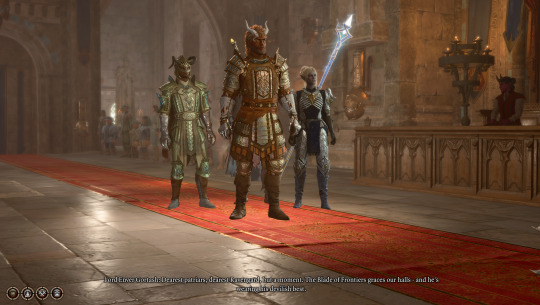
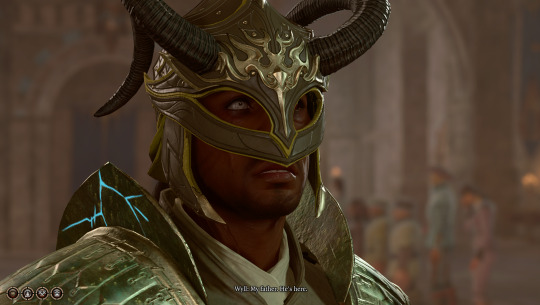
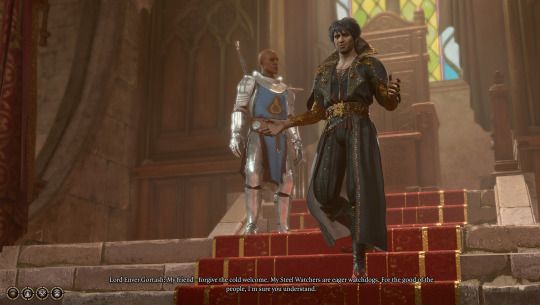
crazy how he just ignores everyone else and speaks directly to wyll. it's like wyll is like one of the most important characters in this game, or something.
#bg3#thoughts about media#I'm sure if karlach is there- gort might address her first instead?#I looked at the screenshots from my other playthroughs to see if I had this scene archived.#of course I literally have everything BUT this part.#I mean it makes a ton of sense why gort addresses wyll.#beyond the fact that wyll's father is there- baldur's gate KNOWS who wyll is. the patriars know who wyll is. they know he was exiled.#gort's trying to make wyll feel small and out of place. referring to him as the blade but undermining his heroic image by mentioning-#-his newly acquired fiendish features. also a bit of a brag I think. since gort himself escaped the hells & a devil physically unchanged.#that and I think gortash is like...a perfect mirror opposite to wyll. so to have them at odds over the fate of baldur's gate makes sense.#fits the whole fairy tale theme of wyll's story too. I mean how many stories are there of cheats like gortash being ousted from their-#-unrightful place on the throne by the true heir? the valiant and just prince come to save his people from the cruel lying tyrant?#*sigh* yet another thing that I wish they developed more in wyll's quest.#because this would all feel like a rather complex and complete story if wyll himself is your avatar.#but when he is a companion- I just don't think the quest features enough to make up for him not being the avatar.#I wish there was more of this- more wyll being the focus- more baldurians recognising who he is! it's HIS city after all!#I AM going to enjoy beating the shit out of gortash again though.#he and mizora are on my “top ten video game characters of all time I'd like to see SKINNED ALIVE” list.
13 notes
·
View notes
Text
Spicy noodles with a Vanguard


(I messed up rendering so badly that I'm also gonna put my lineart here.)
#i play so little destiny now that i don't even have ideas to draw#(completely ignoring my idea list that has been collecting dusts for 2 months)#i think i'm into robots recently#uhhh more like always#hey don't blame me they're irresistible#destiny 2#cayde 6#destiny guardian#destiny guardians#destiny 2 art#destiny 2 fanart#my art#wanna guess how big my reference file for destiny is?
26 notes
·
View notes
Note
Actually "gal" is the woman version of guy, girl is the woman version of boy. Stick to referring to us as women instead of participating in the infantilization of women please 🙃
lmaaoooo you clown
#interesting how this is worded like a Request From The Woman Community#i am in fact a grown ass woman with grown ass woman friends#and when we talk about the shit that effects us as women. the fact that we refer to each other as girls is nowhere near the list#like. this is obvious to anyone who lives in the real world and interacts with other adults#but i suspect anon here is a child from that particular part of the idiotsphere#where the worst things that happen to women are whatever best fuels their need to be a nuisance#and cause their little online dogpiles#like they have this obsessive need to Speak For All Women#and when one of the ~4 billion women in the world disagrees with them?#we are either completely erased from their narrative or used as an example of the aforementioned dogpiling#because god forbid we step out of line#also on the word gal: american ass take#asky ask
31 notes
·
View notes
Text
second night of Murder Mystery DONE all went well i am FREEEEEEEEEEEE!!!!!!!!!
#already made a HUGE to-do list for April i am SO fucking relieved#it’s just so much shit i’ve been TRYING to get done but haven’t been able to do bc everything’s been so overwhelming#but now it’s DONE#and i literally don’t know when the next time is that something is MY responsibility#except for bird walks which don’t count because i’m so comfortable with them that they don’t stress me out lol#like just. i can RELAX and HEAL#late February to mid-March almost broke me. i really almost broke down completely#but i DIDN’T!!!!!!#i kept it TOGETHER and now i’m HERE!!!!!!!!!!#surrounded by love and success#and i got my final reference for my fall birding job application today!!!!!!#i am SO excited - you have no idea#my reference list is a goddamn POWERHOUSE#like. Not to act entitled but i am EXTREMELY qualified and VERY hopeful!!!!#OH and i’m visiting my grandparents at the end of the month and hopefully calling my cousins soon#life is GOOD y’all!!!!! SO good!!!!!!!!!!!#love you all!!! Goodnight!!!!!!!
10 notes
·
View notes
Text


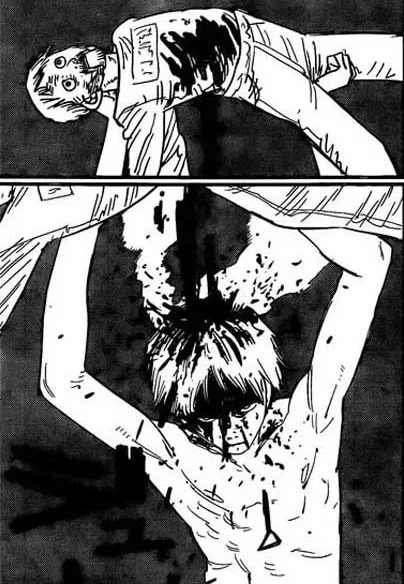



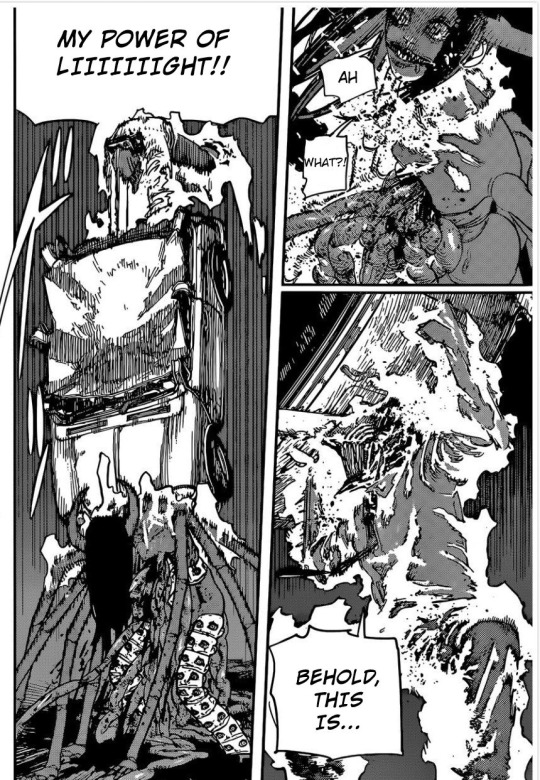



Chainsaw Man Art and Manga References
1. Pietà (Michelangelo, 1488-1489)
2. Neon Genesis Evangelion (manga) (Yoshiyuki Sadamoto, 1994-2013)
3. Saturn Devouring His Son (Francisco Goya, 1819-1823)
4. JoJo's Bizarre Adventure: Stardust Crusaders (Hirohiko Araki, 1989-1992)
5. Napoleon Crossing the Alps (Jacques-Louis David, 1801-1805)
#chainsaw man references#upl#just some faves!#check the thread I linked for a more exhaustive list complete w/ movie refs :)#csm
135 notes
·
View notes
Text
“Do you give a shit about me or not?”
“Of course I do.”
“Then what are you so afraid of?”
I’m afraid of continuing my failure streak. I have a chance to not fail. I have a chance to not fail with you, after already having done so time and time again these last three months. I can stop. To leave and let you go. To put you in the hands of someone I trust, because I don’t trust myself with you. Because I will get you killed. I’ve failed at protecting your innocence. I failed at keeping that clicker completely off you. I’ve failed at keeping you from shooting a man. I failed at protecting you from Sam and I failed at shielding you from Henry. I even fail you in my dreams. I can’t save you anywhere, even in my own head. I have a chance now to stop failing. To leave you and let Tommy take care of you for a while. To do what I think is the best for both of us. For you to get away from me because I will hurt you. I will fail you. I will get you killed. And it’s something I cannot stomach, not again. So I have to leave you while I have the chance. I’m doing this for you. Because I love you. Because I give way too much of a shit about you and I can’t face Hell again. I can’t go back there, especially not with you. And I’m doing this because you deserve better. Whatever the Fireflies do with you, you’ll probably still be better off than with me. Because they’re not cursed with the shadow of death that follows them around every corner. Or even if you end up somewhere else, it’s better than with me, as much as it breaks my heart. Because I want you here with me. I want to finish our journey. I want to figure out what we’ll do after the Fireflies. I want to settle down. I want to live. I want to embrace this second chance I get with you. This new life that’s been laid out so plainly in front of me, both of us. I want to take you in stride and go and never look back. I want to be a father again, I crave it. I long for it. I want to have that life back, and I have a chance to with you. But going back there is also my fear and it’s eating me up inside. Because there will always be something, someone, who will ruin this for me. For us. And I can’t subject you to that. I can’t willingly run through the chance of pain like that with you, so I have to leave you
#she is his biggest love and his biggest fear. that commitment to her.#he wants it. he craves it. but he fears it. he fears of what it will bring. he fears what may happen to her.#but he just loves her so much#mmm refer back to this when I cover ranch argument completely??#NOT TO ALSO MENTION HOW QUICK HE SAYS OF COURSE I DO. HE KNEW WHAT SHE WAS GOING TO ASK#AND HE HAD HIS RESPONSE READY IN AN INSTANT.#BECAUSE HE DOES CARE ABOUT HER. GOGHDFJD SHES AT THE TOP OF THE LIST.#AND HE DIDNT EVEN THINK ABOUT IT BECAUSE ITS SO INTEGRAL TO WHO HE IS.#he loves her so much im going to lick the bottom of my sneakers.#the last of us hbo#ellie williams#tlou spoilers#joel miller
119 notes
·
View notes
Text
why are intro classes so much harder than real ones? i do not have the personality to do fake work
#this fake assignment should have taken like an hour to complete and I'm still working on it#because i cannot find decent sources#even though it's not a real paper it's literally just a reference list#and i chose a really understudied topic without thinking#but he told me to do what I'm actually interested in so i feel like i need to stick with it#but there is literally NOTHING usable outside of journal articles#none of which are in my university library either apparently#so i am technically doing this entire thing wrong because i am incapable of just turning in something bad instead#so rip me
9 notes
·
View notes
Text




An ink cap drawing - and the photos I used as reference.
#creatures#creature design#fantasy art#marker art#fantasy creature#monsters#mushrooms#ink cap mushroom#photos#art by me#photos by me#sootcat#the easiest way to get over any potential moral issues of using photos for reference#is to use your own photos#asking the photographer for permission is real easy then#I just happened to have found the most ink cap looking ink cap I'd ever seen recently when I made this#It was a mushroom prompt list but I only ever did the one prompt#then uuuh dropped out cause I was ALSO doing a bug + mushroom prompt combo at the same time#There's a reason I'm not allowed to start prompt lists in the autumn anymore#it's not cause I can't complete them#it's cause I always overdo it
9 notes
·
View notes
Text
I should a val cubito family tree <- fools errand
#for reference every single parent ive met of one of my kids has completely just went oh you co-parent now#so they are all on the list every single one#val ramblings
4 notes
·
View notes
Text
Nearly done with the spreadsheet!!!!!

#guys this is so autism#23 sheets and counting!!!!!!#every stranger mission every collectable trackable and (soon to be) mapped#it has references between sheets that update automatically#ex you mark 10 stranger missions as complete and that objective in the 100% completion list turns green on its own!!!!!!#same with studied animals plants etc and achievements#i am so nutty about this
10 notes
·
View notes
Note
This broadcast dude came across my feed! I guess they could put pronunciation in the player notes
https://youtube.com/shorts/z2wZv1eUFJw?si=fc4ssdziE71b3oNg
thank you so much for passing this on!!! [video of a broadcaster explaining how he keeps track of player names]
of course they COULD put pronunciation in the player notes, but DO THEY?? and if so, using what notation system? that is the question. it looks like this particular nba broadcaster does not. the mystery remains but we inch ever closer to enlightenment.
#maybe i am trying to prove a negative. maybe no one notates the pronunciation and that's why i can't find evidence of it lol#ball#phonetics#asks#not anon#but this is good information because i could guess that they have little printed out cheat sheets but didn't actually know#like maybe they have ipads. i don't know.#i gotta pay more attention to what's on the table in front of the broadcasters whenever they show them for ten seconds#at the very beginning of the game and sometimes at the half. and when the refs come over to explain a contentious call.#of course i'm sure this clippers broadcaster is not representative of every sports broadcaster ever#but every little tidbit i get paints a more complete and vivid picture. thank you for thinking of me!!!!!#evidence we have so far:#1) ian eagle got permission directly from terrence 'fatt' edwards jr. to refer to him as fatt edwards on air#2) one of my followers who works at a music venue asks performers how to say their name before a show and memorizes it#3) mlb has a public-facing database where you can listen to audio clips of players pronouncing their own names#which also gives phonetic transcriptions (not in ipa or any other phonetic alphabet) but only for a subset of the names#4) this pro basketball broadcaster has a printed sheet of notes on players that he refers to during games. no pronunciation listed
3 notes
·
View notes
Text
tfw u see the fourth Amygdala you’ve encountered in the chalice dungeons:

#delete later#bloodborne#im not mad like ‘wow this is so difficult’#im mad because i KNOW there’s a lot of cool bosses and this game really be like#‘only Amygdala and Abhorrent Beasts for u :)’#I haven’t seen a Watchdog of the Old Lords in like at least half a dozen chalices now :’(#anyway im VERY good at fighting these guys now lmaoooo#one wiki said ‘stand still when it jumps’ AND THAT’S A LIE#dodge backwards and diagonally - i’ve literally never been hit once i started doing that shshejdjdd#anyway im not *really* complaining - im still getting good stuff for beating them and im more in it for runes anyway lmao#but the wikis are completely useless for boss lists#i keep going into Ailing Loran or Lower Loran and encountering Pthumerians and Amygdala as bosses and im like ahsjndnd#so ive stopped using it as reference and just prepare for the worst lolol#speaking of the worst if u read this far: did u know Beast-Possessed Souls can climb ladders?#found that out yesterday and was NOT expecting that#I made it fight a brainsucker tho and after a LOT of wasted time making it work... it killed it in two hits#v satisfying
19 notes
·
View notes